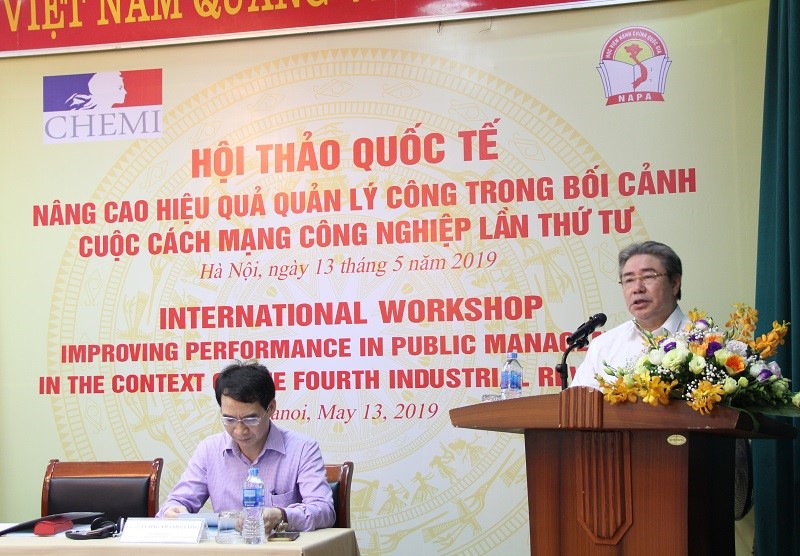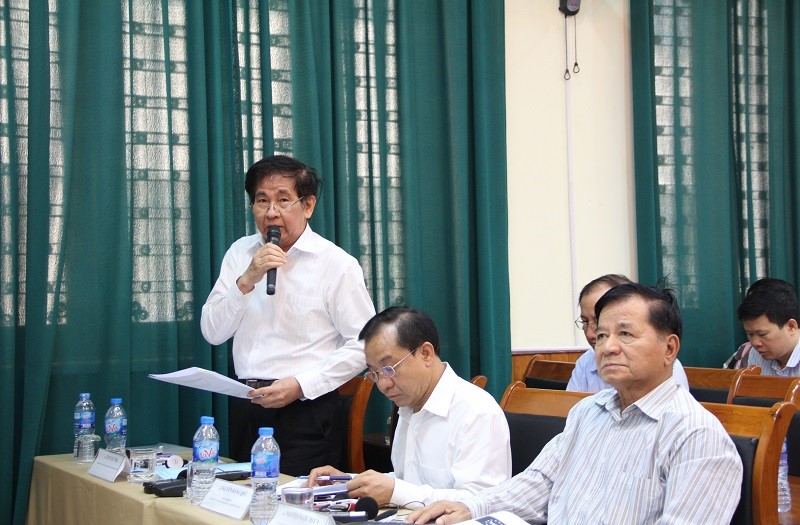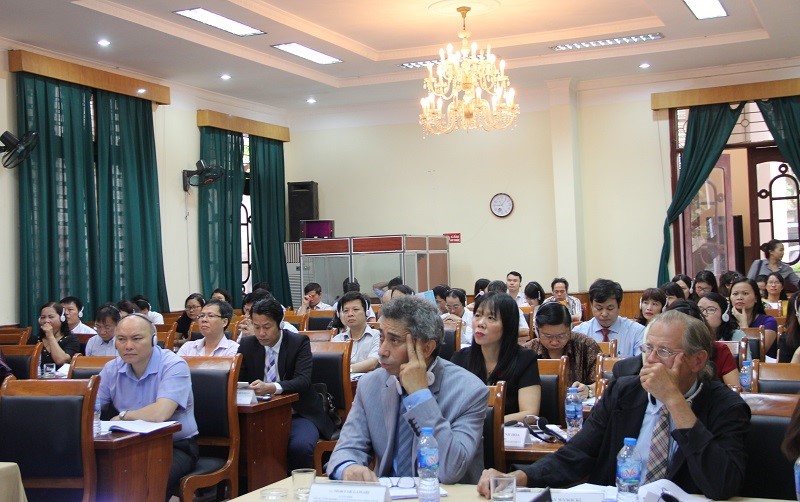The international workshop “Improving Performance in Public Management in the context of the Fourth Industrial Revolution” was held by the National Academy of Public Administration (NAPA) in coordination with Centre of High Studies of the French Home Ministry (CHEMI) on May 13th, 2019 and co-chaired by Dr. Dang Xuan Hoan – NAPA, Mr. Jean Martin Jaspers – CHEMI Director and Assoc.Prof. Dr. Luong Thanh Cuong – NAPA Vice President.
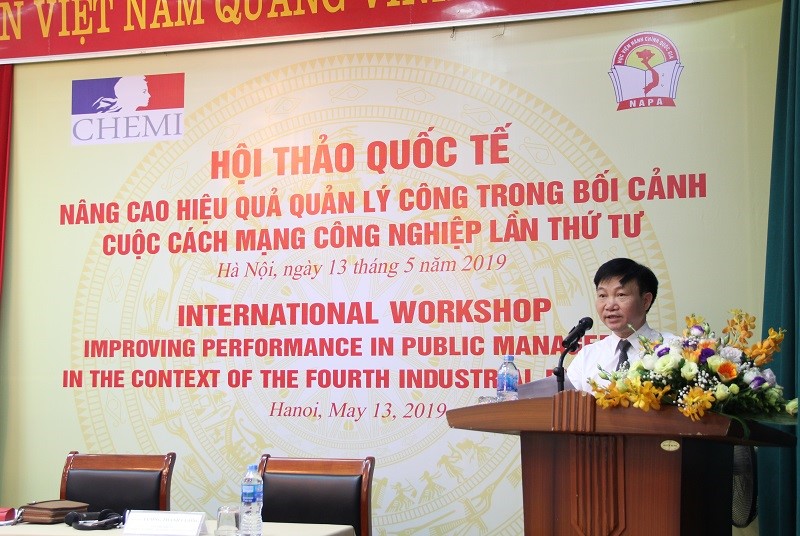
Dr. Nguyen Minh San – Vice Director, NAPA Institute of Administrative Studies introducing the workshop
The workshop was attended by Dr. Nguyen Dang Que – NAPA Vice President; Dr. Jay Wysocki – Academic adviser, Vietnam Initiative, Indiana University, USA; Dr. Moktar Lamari – Director, Centre of Research, expertise and evaluation, ENAP, Québec, Canada; Mr. Park Nam Gie – Councellor, Embassy of the Republic of Korea to Vietnam; Ms. Marriati Lita – Minister Councellor, Embassy of Indonesia to Vietnam; Ms. Laurence Mézin – Head of the Law-Justice-Governance Unit, Embassy of French republic to Vietnam; Dr. Vu Dang Minh – Chief of Office, Ministry of Home Affairs (MOHA); Assoc.Prof.Dr. Van Tat Thu – MOHA Former Vice Minister; NAPA former Presidents; NAPA researchers, managers and falcuties.
Speaking at the workshop, Mr. Dang Xuan Hoan – NAPA President emphasized that the fourth industrial revolution (industry 4.0) has been spreading throughout the world, contributing positively to the socio-economic development of all countries. However, apart from these positive impacts, industry 4.0 is also posing many challenges, especially for developing countries. In order to take advantage of opportunities and overcome challenges, it is a need for them to have strategic solutions, act urgently and invole science – technology forces, enterprises, people, and especially the role of the State as well as of public management.
Mr. Dang Xuan Hoan stated that public management should shift strongly from profound awareness to strategic vision and drastic action urgently in the new context of industry 4.0. Public management should really be a lever for growth and development, a fulcrum for reducing impact shocks and changes, a subject that defines the national vision. Public management needs to create a common perception that in industry 4.0, it is not technology but human capital with creative thinking which is the decisive factor for a nation’s success in the development race to bring prosperity for the country and people.
There are great potentials and opportunities for Vietnam dispite low starting point. Public management needs development orientation based on the needs and practical conditions of the country to maximize benefits from industry 4.0 and sustainable development. To deal with these requirements, Mr. Dang Xuan Hoan asked the participants to focus on exchanging and clarifying issues related to the workshop topic, such as: significant, nature and content of industry 4.0; its impact on public management in Vietnam; opportunities as well as difficulties and challenges it brings for improving performance of public management in the country and propose solutions to improve the effectiveness of public management in the context of industry 4.0.
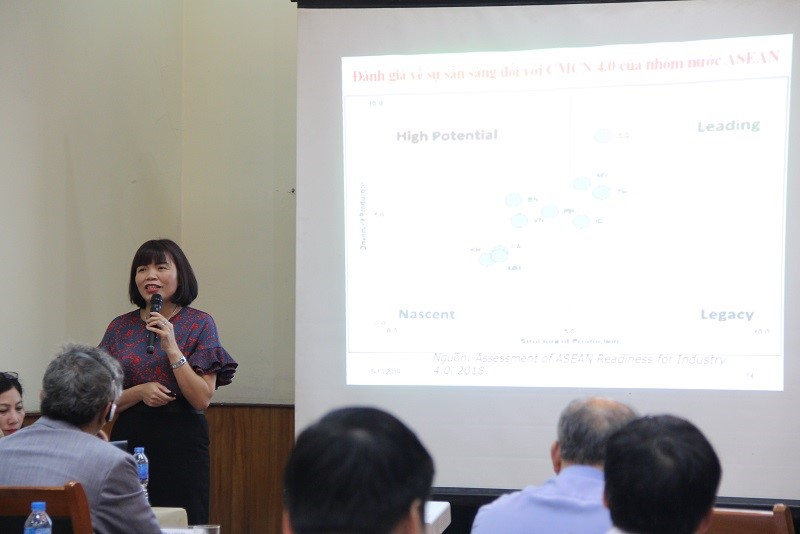
Assoc. Prof.Dr. Nguyen Thi Hong Hai – Dean, Faculty of Administrative Sciences and Organization – Personnel Management emphasizing the importance of the the public sector human resource and proposing solutions for effecrive management in the context of industry 4.0
Through comments and presentations at the workshop, all the participants agreed that industry 4.0 is an indispensable trend in the current period and Vietnam is also not beyond the development trend and impact of this revolution. Industry 4.0 represents a breakthrough change in many aspects, of which the most obvious is the application of artificial intelligence, robots, virtual reality technology, … which are increasingly being strengthened and widely applied in all areas of socio-economic life and directly impact on employment and social stability. This also sets new requirements for public management in both micro and macro aspects, creating opportunities for the State to fundamentally renew social management methods, as well as new challenges to adapt to changes in production technology and life.
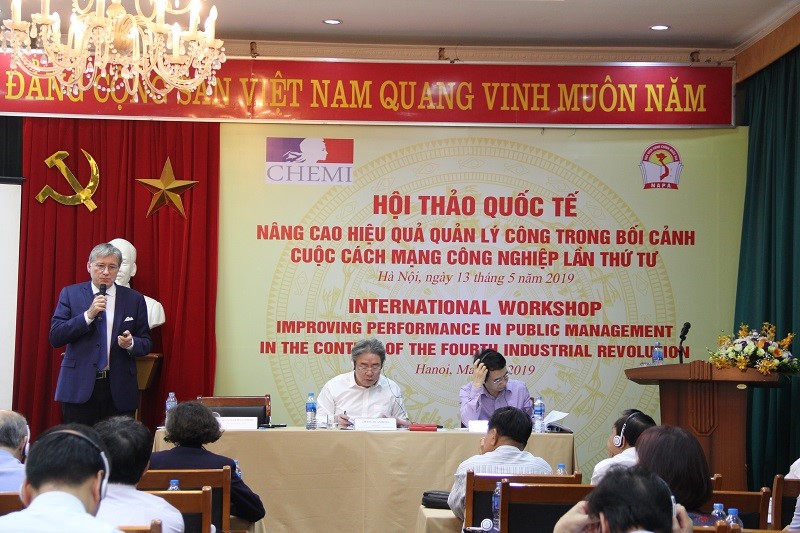
Mr. Jean Martin Jaspers – CHEMI Director in his presentation “The French approaches to improve public management efficiency in the context of the 4th industrial revolution”
In that context, in order to enable effective management, it is supposed that the State needs to renew comprehensively the way, content, methods and approaches in management, to conduct institution, organization and human resource reforms and to strengthen the application of e-government in public management … At the same time, improving the capacity of civil servants is also considered a key factor which plays an important role and deciding the effectiveness and efficiency of public management in the context of industry 4.0.
However, to be able to adapt to changes in industry 4.0, human resources in the field of public management must also meet new requirements of capability and skills such as creativity, flexibility and adaptation to changes, capacity to work in groups and in an international environment, mastering information processing skills in the information technology age so as to make good decisions for management.
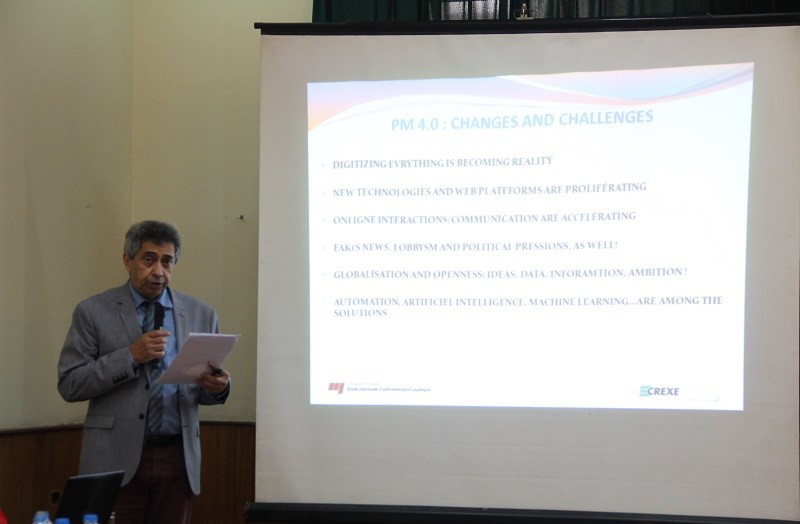
Dr. Moktar Lamari – Director, Centre of Research, Expertise and Evaluation, ENAP, Québec, Canada in his presentation “Public Governance in industry 4.0”
In order to have these capabilities and skills, the public management human resources should be provided with appropriate opportunities, environment, working conditions, good remuneration, wage policies and opportunities to study, improve knowledge and skills, especially skills to access new technologies and apply artificial intelligence … Tools and means of working also need to be modernized and appropriate with industry 4.0. In addition, it is necessary to innovate the recruitment and management to enhance personal responsibility and adopt policies to use public human resources to ensure objectivity, fairness and transparency.
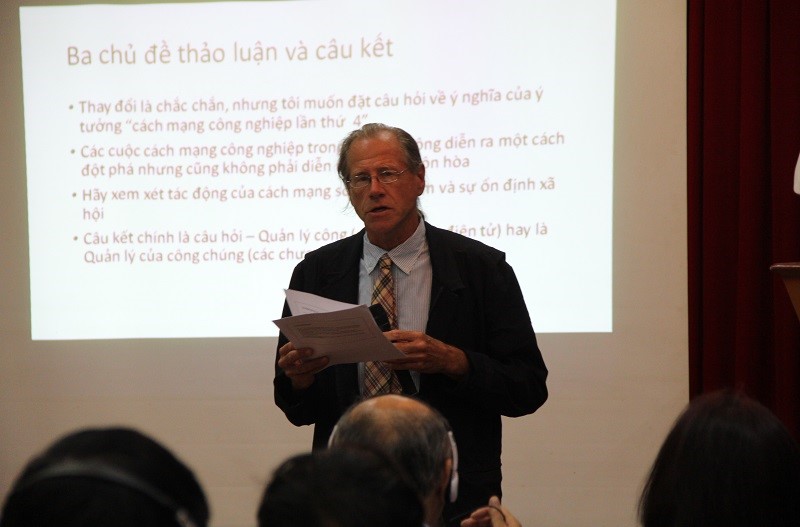
Dr. Jay Wysocki – Academic adviser, Vietnam Initiative, Indiana University (USA) in his presentation: “Public management in the context of the 4th industrial revolution”
The participants supposed that it was necessary to innovate fundamentally civil servant training, focusing on surveying, assessing training needs, changing thinking and approaches to training; renewing the content, program and method of training as well as how to evaluate the effectiveness of training to meet the requirements of industry 4.0. Industry 4.0 is characterized by the application of science and technology, therefore, training also needs to be renewed in the direction of strengthening the application of new forms of education and training such as distant training, virtual reality applications and open data sources, meeting variable needs of learners during industry 4.0 era.

Assoc.Prof.Dr. Dang Khac Anh – Acting Editor in Chief, State Management Review emphasizing the importance of thinking innovation and approaches as well as methods of civil servant training for the requirement of industry 4.0
In his conclusion, Mr. Dang Xuan Hoan highly appreciated the presentations, suggestions and comments made by the workshop participants which were very useful for the Academy as references for NAPA civil servant training programs. This is also the basis for the Academy in consulting the Government and the Ministry of Home Affairs on policies of public governance and public management reform. He affirmed that the workshop would contribute to strengthening the cooperation between NAPA – CHEMI as well as domestic and international research and training institutions at the present and in the future.



